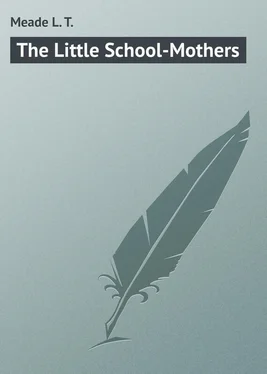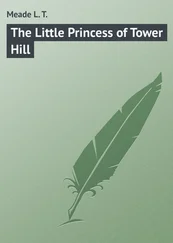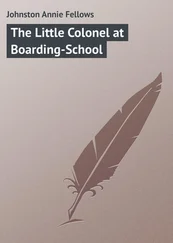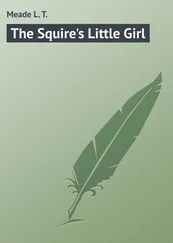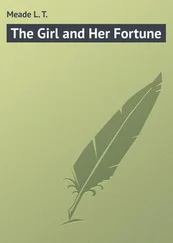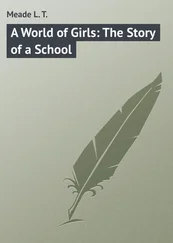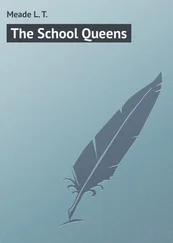L. Meade - The Little School-Mothers
Здесь есть возможность читать онлайн «L. Meade - The Little School-Mothers» — ознакомительный отрывок электронной книги совершенно бесплатно, а после прочтения отрывка купить полную версию. В некоторых случаях можно слушать аудио, скачать через торрент в формате fb2 и присутствует краткое содержание. Жанр: foreign_prose, foreign_children, на английском языке. Описание произведения, (предисловие) а так же отзывы посетителей доступны на портале библиотеки ЛибКат.
- Название:The Little School-Mothers
- Автор:
- Жанр:
- Год:неизвестен
- ISBN:нет данных
- Рейтинг книги:5 / 5. Голосов: 1
-
Избранное:Добавить в избранное
- Отзывы:
-
Ваша оценка:
- 100
- 1
- 2
- 3
- 4
- 5
The Little School-Mothers: краткое содержание, описание и аннотация
Предлагаем к чтению аннотацию, описание, краткое содержание или предисловие (зависит от того, что написал сам автор книги «The Little School-Mothers»). Если вы не нашли необходимую информацию о книге — напишите в комментариях, мы постараемся отыскать её.
The Little School-Mothers — читать онлайн ознакомительный отрывок
Ниже представлен текст книги, разбитый по страницам. Система сохранения места последней прочитанной страницы, позволяет с удобством читать онлайн бесплатно книгу «The Little School-Mothers», без необходимости каждый раз заново искать на чём Вы остановились. Поставьте закладку, и сможете в любой момент перейти на страницу, на которой закончили чтение.
Интервал:
Закладка:
The first form in the school at present only consisted of four little girls. There were Patty and Cissy Price – two wee sisters of seven and six years of age; and there was Curly Pate – as they called her – the youngest girl of all, who was not yet quite six; and there was little Annie, who was older than the others, but very small in stature and very delicate.
Curly Pate was the baby of the school, and was somewhat spoiled in consequence. She was a perfect roly-poly creature, with fat arms and creasy, fat neck and little fat legs. Her face was perfectly round – as round as a ball, and she had blue eyes and a soft complexion, and fluffy, curly, baby hair all over her little head. Her hair was short and thick, and of that fine, fine quality which only very tiny children and babies possess.
From the eldest to the next youngest girl in the school Curly Pate was the darling. Anyone would be proud to walk with her, to caress her, to submit to her whims; and Curly Pate, like all young queens, was exacting. She had her preferences. She liked Constance Amberley better than any of her own small companions. When Constance walked about the grounds with Curly Pate on her back – that young person pretending that she was riding her pony and desiring her “Gee-gee” to go faster, and pounding her on the head and shoulders in no inconsiderable degree – Constance, far from being pitied, was envied by everyone else in the school. But lo, and behold! when Robina appeared, that fickle young person – the school baby – changed her tactics. She walked straight up to Robina on the first day of her appearance in the playground and said:
“I ’ike oo – new dirl!” and established herself on the spot, Robina’s ruler.
Robina was elected to be the baby’s slave, and the others laughed and joked at Constance, and watched the baby with delight. The other little girls followed suit, as very small girls will.
On this special afternoon Robina had the four small children in a circle round her. Curly Pate, it is true, occupied the place of honour on the young lady’s lap, but Patty and Cissie Price, and grave, pale little Annie were also close to the popular favourite.
“Tell us a story, Robina,” asked Cissie Price.
“Not now,” said Robina; “and you are not to pull me, babies, for it makes me too hot. Curly, sit still, you little imp! I’ll put you off my knee if you don’t behave.”
Now none of the other girls in the third form would have dared to speak to Curly in that tone. They would have received a slap in the face for their pains, but Curly took it quite meekly from Robina.
“I – is – dood. I is – vedy dood. I ’ove oo,” she said.
She nestled up close to Robina, pulling that young person’s hand round her waist, and patting the said hand with her own two fat little ones and saying, over and over again: “I ’ove oo, Wobbin – I ’ove oo!”
It was on this scene that Harriet and Jane appeared. Since Robina had come, Harriet had rather avoided her. She had been jealous, poor child, from the first moment; but now she altered her tactics, and forcing her way through the group, sat down close to the new favourite.
“There’s no room here,” said Robina. “Go a little further off, please, Harriet; you are pushing little Annie and making her cry.”
“I don’t care twopence for little Annie!” cried Harriet, rudely. “I have as good a right to sit here as anybody else. Don’t press me, Annie; if I am in the way, you’re the person to make room, not me. Go back to your nursery, won’t you?”
Annie, who was a very timid child, began to cry. Robina immediately rose, lifted Curly Pate on to her shoulder, and said to the three other little ones:
“I have changed my mind. I will tell you a story now, but no one else shall listen; it’s a lovely, true, true fairy tale. We’ll just sit under that tree, and you shall all hear it.”
They followed her, clinging to her skirt and one of them trying to grasp her hand. Harriet’s face grew black. Frederica said:
“Well, Harriet, you don’t look too well pleased; but for my part, I think Robina was quite right; you ought not to have taken poor little Annie’s place.”
“Do you mind telling me,” answered Harriet, “what right those children have to interfere with us? They belong to the first form; let them stay in their nursery.”
“Oh, as to that,” said Rose Amberley, “they have as good a right to the lawn as we have. They are always allowed to play here every afternoon; and Robina invited them to tea; she bought a lot of sweeties, chocolates and cakes for them. They are Robina’s guests; they just worship her.”
“Worship her, indeed!” said Harriet. “Well — I don’t worship her.”
“Anyone can see that, Harriet, and it is a great pity,” said Rose Amberley. “Robina is a very nice girl, and as good as gold.”
“Oh, is she!” said Harriet. “Jane, what do you think?”
“I know what I know,” said Jane, nodding her little head with great firmness.
Frederica looked very hard at Jane; then she glanced at her own sister.
“Look here,” she said suddenly; “we have all been very happy at school, haven’t we?”
“Who says we haven’t?” answered Harriet. She felt crosser than ever, for there were such peals of laughter coming from under the shelter of that tree, where Robina was telling the babies her fairy tale. “Who says we haven’t?” she repeated.
“The reason we have been happy,” continued Frederica, “is simply this: we have been – or at least we have tried to be – good. It would indeed,” continued the young girl, “be very difficult to be anything but good here – here, where things are so sweet and everyone is so kind, and even lessons, even lessons are made such a pleasure. Why shouldn’t we all keep on being good? why should we be jealous?”
“Who says anyone is jealous?” said Harriet.
“Oh, Harriet!” said Frederica; “you know you are, just a little bit.”
“I don’t wonder she’s jealous!” suddenly burst from Jane. “Robina has taken her place in class. Harriet is our clever one; she doesn’t want to – to – ”
“Oh, I am sure she is not small-minded enough for that,” said Frederica at once. “If a cleverer girl comes to the school – ”
“She is not cleverer!” burst from Harriet.
“Well, Harriet, you’ve got to prove it. If you are clever, work still harder, and resume your place in the class, and I’m sure we’ll all be delighted: fair play is fair play, and it’s very mean of you to be angry about nothing. Ah! here comes tea, and I am so thirsty. Let’s help to lay it out, girls!”
Immediately every girl had started to her feet: a white table-cloth was spread on the lawn, cups and saucers followed suit; tea, cake, bread and butter, dishes of fruit were soon being eagerly discussed. The small children gave a whoop of excitement, and Robina returned, still carrying Curly Pate, with the others in her train.
During tea, one of the little ones suggested that they should turn Robina into a queen. No sooner had the thought been uttered than it was put into execution. She was seated on a special chair and crowned with flowers, which the children had been gathering for her. A wreath of flowers surrounded her laughing face, and a garland of flowers was placed round her neck. Curly Pate looked on just for a minute, then said eagerly: “Me too! me too!”
“Why should there not be two queens?” said Robina. “Gather some white flowers for the baby, somebody.”
“Somebody” meant everybody – that is, except Harriet, for even Jane was drawn into the whirlpool of excitement. Nothing could be prettier than the happy faces of the children; and especially of the queen with her flowers – her cheeks slightly flushed, her queer, half-wild, half-pathetic eyes brighter and darker than usual, one arm encircling Curly Pate’s dear little fat body, and of Curly Pate herself, shrieking with delight while a crown of white daisies encircled her little head.
Читать дальшеИнтервал:
Закладка:
Похожие книги на «The Little School-Mothers»
Представляем Вашему вниманию похожие книги на «The Little School-Mothers» списком для выбора. Мы отобрали схожую по названию и смыслу литературу в надежде предоставить читателям больше вариантов отыскать новые, интересные, ещё непрочитанные произведения.
Обсуждение, отзывы о книге «The Little School-Mothers» и просто собственные мнения читателей. Оставьте ваши комментарии, напишите, что Вы думаете о произведении, его смысле или главных героях. Укажите что конкретно понравилось, а что нет, и почему Вы так считаете.
